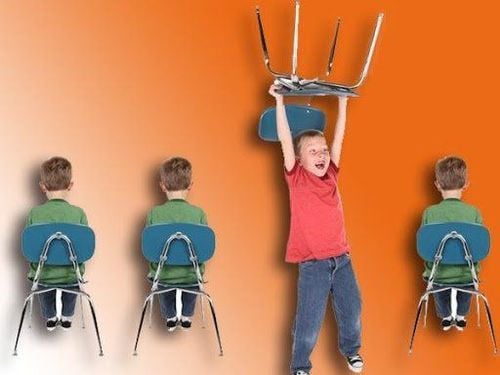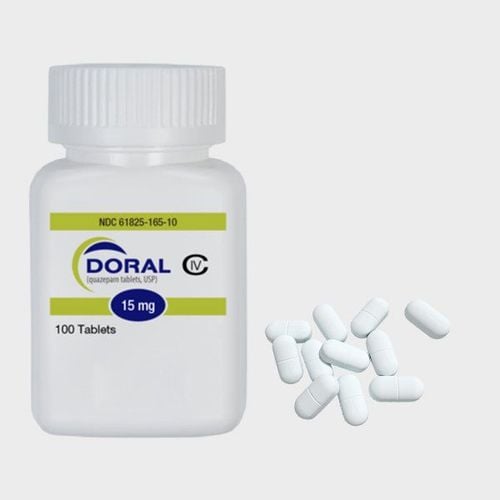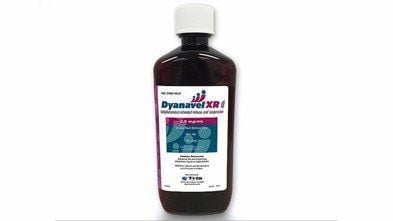This is an automatically translated article.
Attention-deficit/hyperactivity disorder is a mental health condition that causes abnormally hyperactive and impulsive behavior, with difficulty paying attention or sitting still. It is possible to assess the symptoms of a child with ADHD within 6 months and gather information from adults to make a diagnosis.
1. At what age should attention deficit hyperactivity disorder be assessed?
Most experts say that it is difficult to be certain whether a 6-7 year old child has ADHD. This is because many of the typical symptoms of ADHD, such as short attention spans and impulsive actions, are normal in preschoolers and they change very quickly during childhood. this.
But if you suspect your child is showing signs of an unusual disorder, you can always consult your pediatrician about evaluating your child, even if your child is still in kindergarten. Especially when preschoolers can't pay attention and focus, leading to no progress in learning. Specialists are increasingly diagnosing this condition more accurately, benefiting early treatment for children. While medication is hardly suitable for children under 6 years of age, certain behavior modification techniques can be of great help.

Các biểu hiện của rối loạn tăng động giảm chú ý thường rất khó phát hiện
2. Find a specialist
You should start with seeing your pediatrician, who can do some preliminary tests to rule out other causes, such as vision or hearing problems, that may be contributing to the problem. to your child's unusual behavior. Attention-deficit/hyperactivity disorder in children is a relatively new condition and there are differing opinions on the treatment regimen. If the doctor knows your child well and has a lot of experience evaluating for this disorder, they may be the best person to make a diagnosis. On the other hand, some experts say that you should see a developmental pediatrician, neurologist, child psychiatrist, child psychologist. The key is to find someone with a lot of experience and make sure you feel comfortable working with them.
3. Time and cost
There is no exact standard by which to judge a child for ADHD. Many children have trouble paying attention, but that doesn't mean they have ADHD. Depression, anxiety, and learning disabilities can all be misdiagnosed with ADHD. About a third of children with ADHD also have some other problem at the same time, such as delayed speech and poor language.
Recommended video:
Signs your child has school age depression
According to experts, the correct assessment process must take at least 3 hours or more. ADHD symptoms aren't always obvious in every random situation or moment, so it's important for a professional to observe your child in different settings over a period of time. Then, they need to discuss with experienced colleagues, as well as adults who often have contact with children for a long time, before reaching a conclusion.
Evaluation of attention deficit hyperactivity disorder in children is not cheap and is rarely covered by insurance. While costs can vary depending on where you live and the clinic you choose, the average figure is around $500 in the US. It should be noted that regular physical examination doctors are not specialists, so you will have to pay an additional fee for consultation and consultation with a specialist in this field. If the price is too high, ask your child's doctor or school for information about special services at an appropriate cost.
4. Evaluation steps
The following is a summary of the steps needed to assess attention deficit hyperactivity disorder in children:
4.1. Take a close look at your personal, family, and medical history
The doctor will start by asking you a lot of questions (or asking you to fill out a survey) about the health history of your child and family. Attention-deficit/hyperactivity disorder often runs in families, but may be undiagnosed. The doctor will also want to find out how long your child has had symptoms of ADHD (most obviously lasting more than 6 months) and whether he or she exhibits them in a variety of settings, such as school and school. at home.
4.2. Patient interview
The doctor will talk to the child both when the parents are present and when only the child is in the room. Sometimes children will speak more freely if their parents are not listening. The doctor may ask questions such as: "What is your favorite subject at school? What do you not like? Why?" Depending on the age of the child, the rating scale or software will determine the level of development or difficulties.
The doctor will also observe if your child is restless, restless, or pays little attention to the interviewer. The child's total assessment will likely be divided into two sessions, each approximately 60 minutes long.

Cho trẻ đi thăm khám bác sĩ tâm lý
4.3. Interview with parents
The professional will probably start interviewing the parents with the child to understand how your family interacts, and then continue with just you and your wife. When your child isn't there, it's time to talk about your worries and frustrations about your child not paying attention, not doing homework or chores, non-stop activities, etc.
The interviewer will want to know about your home life and parenting style, how much time your child does homework and in what setting, how well the child gets along with the neighborhood kids, etc. You may also be asked to fill out a questionnaire or rating scale about your child's abilities and symptoms. The interview in the presence of the child usually lasts about 1 hour. The second interview, without the child, can last 90 minutes.
4.4. Interview with a teacher
If your child is in school, the doctor will ask the teacher to fill out a rating scale or behavioral checklist and will do a face-to-face interview for about half an hour, asking about things like: does the child have difficulty with have to wait their turn, don't seem to listen when the teacher speaks, or often leave their seats in class, etc. If your child is sent to daycare or attends an extracurricular class, you might as well. get input from the teachers there.

Nói chuyện với giáo viên giúp đánh giá rối loạn tăng động giảm chú ý ở trẻ
4.5. Physical examination
The doctor will ask for a complete physical exam to rule out possible causes of ADHD-like symptoms, such as vision or hearing problems.
Recommended video:
What to do when a child has attention deficit hyperactivity disorder? Expert advice
4.6. Follow
Once the evaluation is complete, your doctor will likely want to see you again in about 1 hour to talk about your treatment. If drug treatment is possible, specialists will talk to each other before prescribing. If you are not satisfied with the results of the evaluation or the recommended treatment, you can suggest an opinion.
In addition to medication, other treatment options may include behavioral therapy (changing a child's environment to improve behavior), parenting training (giving you skills to deal with the behavior). children in positive ways), conditions at school (talk with the school to make it easier for your child to learn), and other alternative treatments.
Children are curious, hyperactive but very vulnerable. Attention deficit hyperactivity will affect the child's later development. Therefore, every parent should give their children proper love and attention, accompanying them both now and in the future.
Please dial HOTLINE for more information or register for an appointment HERE. Download MyVinmec app to make appointments faster and to manage your bookings easily.
Reference source: babycenter.com













